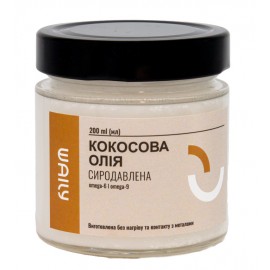Coconut
Coconut oil
The unrefined oil is creamy in color with a subtle coconut smell. The oil is produced by pressing on a vertical press in an oak tub without thermal or chemical treatment. This technology for producing oil requires more raw materials, but the resulting product retains all nutrients and biologically active substances, as well as taste.
Nutrients
Vitamins: A, E, B1, B2, B3, K, C;
Macro-, microelements: Fe, Na, Mg, Ca, F;
Fatty Acids: Omega-3, Omega-6 and Amino Acid Complex.
Coconut oil - health benefits
Cosmetic
Coconut oil is an excellent remedy for strengthening hair and giving it a healthy, shiny appearance.
Coconut oil can be used for the delicate care of the softest skin areas (around the eyes and in the décolleté) and anti-aging therapy.
Culinary
Coconut oil does not form harmful compounds when heated and fits best for frying.
Due to its taste and smell, it complements well any desserts and pastries.
When using coconut oil, baked goods stay fluffy longer and retain their flavor.
Medicinal
Coconut oil can be used as an antifungal and antibacterial agent.
Regular consumption helps to relieve the symptoms of gastrointestinal diseases.
Coconut oil can be used to treat seasonal allergies. The oil is also good for preventing or relieving symptoms of colds and flu.
Coconut oil - how to use
For nourishing hair ends and smooth styling, a few drops of oil can be applied to strands before brushing.
It is used to moisturize and protect the skin of the face and body - it is recommended to apply to the body after taking a shower.
Due to its antibacterial properties, it is used to cleanse the oral cavity and whiten teeth - it is recommended to keep 1-2 tbsp for 10 minutes in the mouth.
As an adjuvant, it can be used to treat fungal infections.



